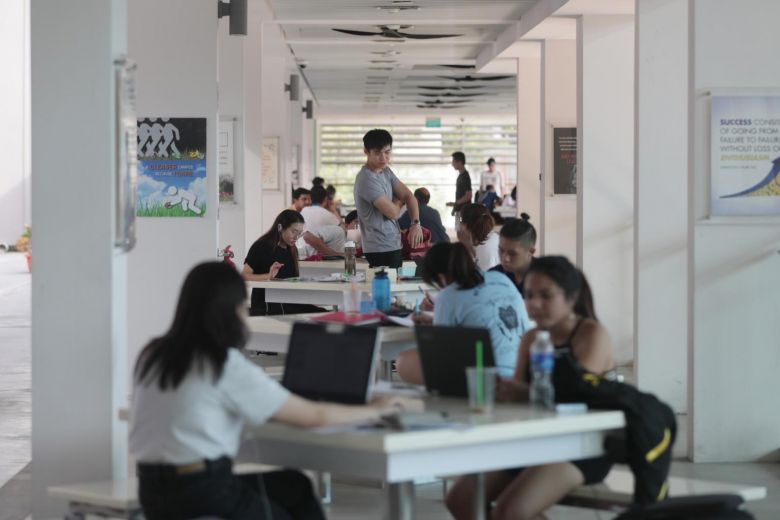Part-time poly, uni students on bursaries to get more help
MOE says about 2,100 S'porean students are expected to benefit from higher bursaries next year
Sign up now: Get tips on how to help your child succeed

A photo taken on Dec 4, 2019, shows students in Singapore Polytechnic. The Ministry of Education said about 2,100 Singaporean part-time undergraduates and diploma students are expected to benefit from increased bursaries next year.
ST PHOTO: KELVIN CHNG
Part-time students in universities and polytechnics on bursaries will pay lower tuition fees from next year, just like their peers studying full time, with higher bursaries to kick in from next year.
In particular, part-time undergraduates and diploma students in the bottom income group - whose gross monthly household income is $4,000 or less, or monthly household income per capita is $1,000 or less - will get more financial support.
The Ministry of Education (MOE) said in a statement yesterday that about 2,100 Singaporean part-time undergraduates and diploma students are expected to benefit from increased bursaries next year, with the Government investing $2.8 million per year for part-time students, up from the current $1.8 million.
About 1,900 part-time students get bursaries now.
Part-time undergraduates in the lower-income group earning $4,000 or less will receive $2,500 annually in bursaries, up from $1,350 previously, while part-time diploma students will get $800 instead of $600.
Part-time university students from the next tier of families - whose gross monthly household income is $4,001 to $6,900 - will get $1,600 in yearly bursaries, an increase from the current $1,350. Those in polytechnic will get $660, an increase from the current bursary amount of $600.
Part-time undergraduates and diploma students whose gross monthly household income is $6,901 to $9,000 will continue to receive yearly bursaries of $700 and $300, respectively.
The bursary for part-timers will also be known as the Higher Education Bursary from next year, and it aims to "enhance the affordability of higher education for part-time students studying at publicly funded post-secondary education institutions", MOE said.
There are currently about 19,000 part-time students in polytechnics and universities, and the average annual part-time fees are $900 and $4,500 for diploma and degree courses, respectively.
The higher bursaries mean part-time diploma students from the lowest income group will pay $100 a year, down from the current $300, while part-time degree students from the same tier will pay $2,000 a year, compared to $3,150 now.
New and existing Singaporean students enrolled in publicly funded part-time courses at all five polytechnics and the autonomous universities that offer such programmes are eligible for the financial support.
Students at the National Institute of Early Childhood Development, set up by the MOE, will also benefit.
The greater support for part-time students comes after MOE announced in August significant bursary hikes for full-time students pursuing higher education.
All in, around 21,000 undergraduates and 33,000 polytechnic students - in full-time courses - are expected to benefit from the bursaries, as government spending on bursaries increases by $44 million per year, from $123 million currently.
Technical officer Muhammad Zulfarhan Abdul Azis, 27, said the higher bursary will help offset his university fees, which come up to $6,000 to $7,000 per year.
The father of two boys, aged 18 months and two months, is in his fourth year at Nanyang Technological University studying electrical and electronic engineering about three to four evenings a week while juggling a full-time job. His wife is a kindergarten teacher.
"I prefer to have work experience so that I can support my family, but I also want to upgrade myself," he said, adding that he hopes to become an engineer in the future.


